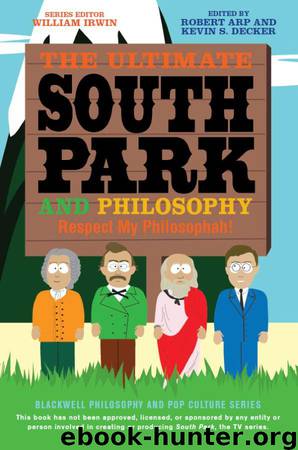The Ultimate South Park and Philosophy by Irwin William Arp Robert Decker Kevin S

Author:Irwin, William, Arp, Robert, Decker, Kevin S. [Irwin, William, Arp, Robert, Decker, Kevin S.]
Language: eng
Format: mobi, epub
Publisher: Wiley
Published: 2013-06-26T14:00:00+00:00
South Park and the “Enemies”
Despite the over-the-top themes of most South Park episodes, it’s likely that co-creators Parker and Stone would share Popper’s distrust of political extremism. Time and time again, they develop characters and circumstances that ridicule various “enemies” of the open society. For Parker and Stone, as much as for Popper, democracy is endangered by extremist threats from both the political right and the political left. Recall Parker’s claim during the Charlie Rose interview that the “people screaming on this side and the people screaming on that side are the same people, and it’s OK to be someone in the middle, laughing at both of them.” While the strategy of Parker and Stone is not so much to argue with extremists as to mock them, there is no question that the duo consistently singles out fanatics of all sorts for especially vicious treatment.
Consider Cartman. Anti-democratic and authoritarian, Cartman is often portrayed as a ridiculous, albeit unusually young, right-wing fanatic. In an interview with NPR’s Fresh Air, Parker explains, “We always thought of him as a little Archie Bunker.”8 For example, Cartman brings the dramatic presentation style of conservative television personality Glenn Beck to South Park Elementary’s morning announcements in “Dances with Smurfs.” He also embraces the role of a xenophobic border patrol agent for a backyard game of “Texans versus Mexicans” in “The Last of the Meheecans.” In fantasizing about a career in law enforcement, Cartman yearns not to help people or serve his community, but to have others, as he drawls, “respect my authoritah.” (To our horror and amusement, Cartman actually manages to get himself deputized in “Chickenlover.”) And Cartman’s unchecked interest in making money leads him to webcast fights between cocaine-addicted infants in “Crack Baby Athletic Association.” For these and countless other extreme actions, Cartman rarely makes it through an episode without being ridiculed or otherwise punished.
Parker and Stone satirize the political left, too, especially when left-wing politics lead to the sort of hypocrisy inconsistent with an open society. For example, South Park often targets liberal efforts sometimes tagged as “political correctness.” This is especially true of politically correct attempts to limit offensive language, such as the slurs and epithets in “With Apologies to Jesse Jackson” and “The F Word.” But South Park targets heavy-handed efforts to control behavior as well. In “Ike’s Wee Wee,” Mr. Mackey attempts to convince Kyle, Stan, and the rest of Mr. Garrison’s class that smoking, alcohol, and drugs are bad. Alas, his presentation doesn’t reveal a sophisticated understanding of substance abuse or addiction. Instead, in a rather paternalistic and condescending lecture, Mr. Mackey simply tells the children: “Smoking’s bad; you shouldn’t smoke. And, uh, alcohol is bad; you shouldn’t drink alcohol. And, uh, as for drugs, well, drugs are bad; you shouldn’t do drugs.”
The left-wing liberalism of many Hollywood celebrities also receives brutal treatment on South Park. Indeed, Parker and Stone seem to reserve some of their most merciless attacks for outspoken stars like Tom Cruise, who is portrayed as
Download
The Ultimate South Park and Philosophy by Irwin William Arp Robert Decker Kevin S.epub
This site does not store any files on its server. We only index and link to content provided by other sites. Please contact the content providers to delete copyright contents if any and email us, we'll remove relevant links or contents immediately.
Wonder by R.J. Palacio(8572)
Mastering Adobe Animate 2023 - Third Edition by Joseph Labrecque(3838)
Unlabel: Selling You Without Selling Out by Marc Ecko(3658)
Ogilvy on Advertising by David Ogilvy(3607)
Hidden Persuasion: 33 psychological influence techniques in advertising by Marc Andrews & Matthijs van Leeuwen & Rick van Baaren(3557)
Drawing Cutting Edge Anatomy by Christopher Hart(3524)
The Pixar Touch by David A. Price(3431)
POP by Steven Heller(3356)
The Code Book by Simon Singh(3180)
The Art of War Visualized by Jessica Hagy(3000)
Slugfest by Reed Tucker(2997)
The Curated Closet by Anuschka Rees(2968)
Rapid Viz: A New Method for the Rapid Visualization of Ideas by Kurt Hanks & Larry Belliston(2898)
Stacked Decks by The Rotenberg Collection(2880)
365 Days of Wonder by R.J. Palacio(2830)
The Wardrobe Wakeup by Lois Joy Johnson(2780)
Keep Going by Austin Kleon(2756)
Tattoo Art by Doralba Picerno(2661)
Tell Me More by Kelly Corrigan(2650)
